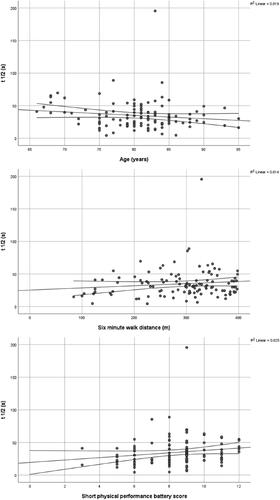Association between mitochondrial function measured by 31P magnetic resonance spectroscopy and physical performance in older people with functional impairment
Abstract
Background
Mitochondrial dysfunction is a potential therapeutic target to improve skeletal muscle function, but the contribution of mitochondrial dysfunction to impaired skeletal muscle performance in older people remains unclear. The aim of this analysis was to test the association between measures of skeletal muscle mitochondrial function and physical performance in older people.
Methods
We analysed data from the Allopurinol in Functional Impairment trial. Participants aged 65 and over, who were unable to walk 400 m in 6 min, underwent 31P magnetic resonance spectroscopy of the calf after exercise at baseline and at 20 weeks follow up. The phosphocreatine recovery half-life time (t1/2) was derived as a measure of mitochondrial function. Participants undertook the 6-min walk test and the Short Physical Performance Battery. Muscle mass measured using the Akern 101 bio-impedance analysis system. Bivariate correlations and multivariable regression analyses were conducted to determine associations between t1/2 and baseline factors.
Results
One hundred and seventeen participants underwent baseline 31P magnetic resonance spectroscopy, mean age 80.4 years (SD 6.0); 56 (48%) were female. Mean 6-min walk was 291 m (SD 80), mean SPPB score was 8.4 (SD 1.9); t1/2 correlated significantly with Short Physical Performance Battery score (r = 0.22, P = 0.02) but not with 6-min walk distance (r = 0.10, P = 0.29). In multivariable linear regression, muscle mass and total body weight, but not t1/2, were independently associated with Short Physical Performance Battery score and with 6-min walk distance. Change in t1/2 was not significantly associated with change in Short Physical Performance Battery score (r = 0.03, P = 0.79) or with change in 6-min walk distance (r = −0.11, P = 0.28).
Conclusions
Muscle mass, but not phosphocreatine recovery time, was consistently associated with Short Physical Performance Battery score and 6-min walk distance in older people with functional impairment.


 求助内容:
求助内容: 应助结果提醒方式:
应助结果提醒方式:


